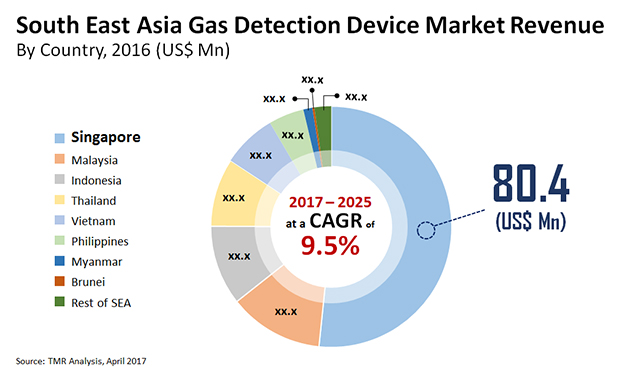
The South East Asia gas detection device market features a highly consolidated vendor landscape, with the top five vendors collectively holding a massive 87.1% of the market in 2016, observes Transparency Market Research (TMR) in a recent report. These leading vendors, namely Honeywell International, Inc., Drägerwerk AG & Co. KGaA, Riken Keiki Co., Ltd., Mine Safety Appliances, and New Cosmos Electric Co., Ltd., have have been able to establish strong presence in South East Asian countries owing to their well-established distribution networks in the region.
The market is highly competitive and domestic and regional vendors run the benefit of close ties with government bodies. New entrants are expected to have least leeway in the market owing to the stringent regulations put in place by government and industrial bodies. The report also notes that the lack of product differentiation is one of the key challenges for companies operating in the South East Asia gas detection devices market. To make their way through this challenge, leading vendors are focused on the development of products with innovative features such as multiple channels and increased monitoring capacity. An instance is the BW Clip Real Time maintenance-free single gas detector launched by Honeywell International Inc. in March 2016. The device is said to operate continuously and provide real-time display of gas levels for gases such as hydrogen sulfide, carbon monoxide, oxygen, and sulfur dioxide.
Transparency Market Research estimates that the South East Asia gas detection device market will exhibit a promising CAGR of 9.2% during the period from 2017 to 2025, rising from a valuation of US$155.6 mn in 2016 to US$ 337.6 Mn by 2025.
Request PDF brochure:
https://www.transparencymarketresearch.com/sample/sample.php?flag=B&rep_id=21278
Thriving Petrochemicals Industry to Provide Massive Growth Opportunities
Of the key areas of application across a number of industries analyzed in the report, the South East Asia gas detection market is gain a large chunk of revenue from applications in the petrochemical industry in the next few years. The petrochemical industry in the region is expected to hold a 20.5% of the overall market in 2017 and continue strong growth over the forecast period as well, exhibiting a promising 8.4% CAGR from 2017 to 2025. However, the automotive and materials industries are expected to lead in terms of rate of growth over the forecast period, hinting towards the vast growth opportunities for players in the market.
In terms of geography, the market in Singapore accounted for a massive 51% of the overall market in 2016. The country continues to lead to strong demand for gas detection devices owing to the stringent workplace safety regulations in place. It is expected to account for a massive share of the South East Asia gas detection market over the forecast period as well.
Request enquiry before buying:
https://www.transparencymarketresearch.com/sample/sample.php?flag=EB&rep_id=21278
Stringent Workplace Safety Norms to Compel Installation of Gas Detection Devices in Industries
Some of the leading factors driving the South East Asia gas detection market are the rising demand for remote monitoring, increased focus on ways of reducing operational expenses, stringent policies and regulations put in place by government bodies to ensure worker safety at workplaces, and the rising demand for reducing facility downtime during turnaround operations. Workplace safety regulations and policies will remain the key driver of growth of the South East Asia gas detection market in the near future.
Request for custom research:
https://www.transparencymarketresearch.com/sample/sample.php?flag=CR&rep_id=21278





